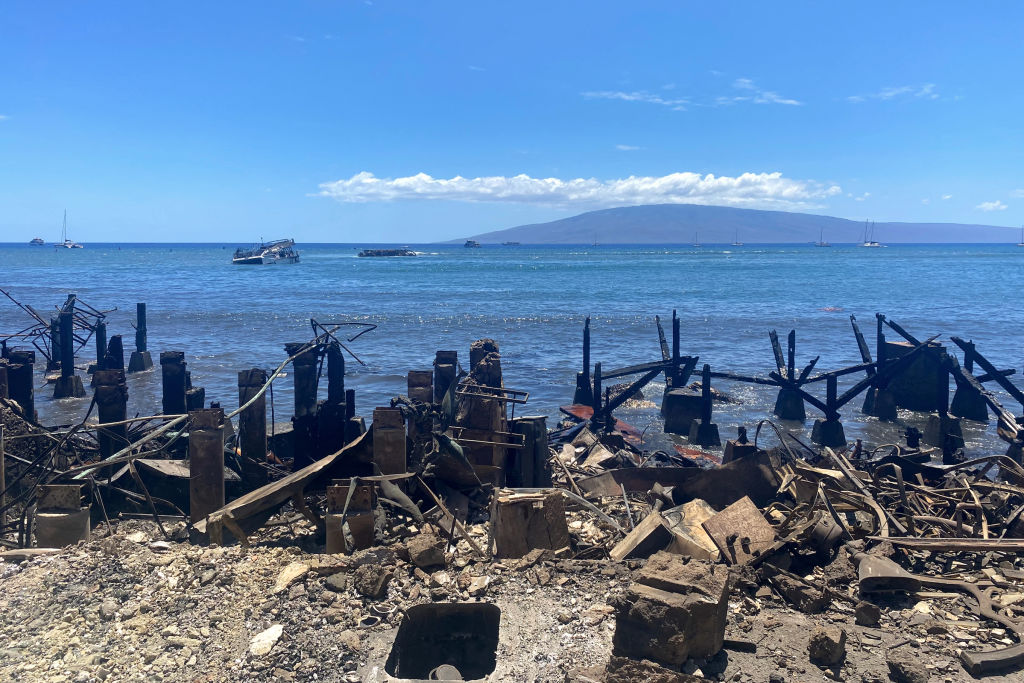The threat spectrum

Planet A
Climate change played a role in the severity of last week’s wildfires in Maui, Hawaii, where average temperatures have increased by 2°C since 1950. Other factors such as thinning clouds, La Niña and declining annual rainfalls also contributed to the devastation caused by one of the deadliest US wildfires in more than a century. Experts have further speculated that the impact of Hurricane Dora, which fanned the flames while passing south of Maui, was exacerbated by climate change.
The wildfires killed at least 114 people, forced thousands of residents and tourists to flee, and devastated the city of Lahaina. According to the county mayor, 850 more people are still missing. Aside from the devastation in Hawaii, the effects of climate change have contributed to the severity of wildfires in Canada, western Europe and the Mediterranean, and to flooding and rainstorms in Europe.
Democracy watch
Iranian authorities have detained at least a dozen women’s rights activists ahead of the first anniversary of protests against the country’s system of clerical rule and gender discrimination set up after the 1979 revolution. None of those arrested have been named and the exact charges have not been listed. In recent weeks, the government has increased morality police patrols and deployed surveillance cameras to catch women violating hijab rules. The increased security reflects the authorities’ concerns about a new round of protests.
The protests which started last September were sparked by the death in custody of Mahsa Amini, who had been arrested for ‘improperly’ wearing her hijab. The hijab quickly became a symbol of official repression, with women and girls defiantly removing them in public and protestors adopting the rallying cry of ‘women, life, freedom’. Tehran responded with a brutal crackdown involving executions, mass arrests and detentions.
Information operations
Since the military coup on 26 July, Niger has emerged as a hub of disinformation in the Sahel region, complicating responses to the political turmoil. Numerous social media posts both supporting and discrediting the coup leaders who ousted President Mohamed Bazoum have been exposed as false. Misleading content includes fabricated videos, manipulated audio recordings, and deceptive reports about foreign involvement.
Disinformation about Niger often surfaces in encrypted platforms like Telegram and WhatsApp before spreading to other social media channels. Notably, a network led by the Pan-African Group for Trade and Investment, helmed by pro-Russian figure Harouna Douamba, plays a pivotal role in exacerbating tensions through its web of websites and Facebook pages. This intricate network fuels anti-French sentiment and propagates baseless claims about destabilisation plots.
While foreign influences are at play, the current surge of disinformation is equally attributed to local actors, including pan-African activists leveraging alliances with Russia to advance personal interests and political ambitions.
Follow the money
The US State Department said it would sanction Chinese officials in response to allegations that young Tibetans are being forcibly assimilated, expanding its focus on Beijing’s treatment of ethnic minorities. The department accused China of forcibly assimilating over a million Tibetan children in government-run boarding schools, separating them from their families and teaching them only in Mandarin, with the ultimate goal of curtailing their distinct linguistic, cultural and religious traditions. Secretary of State Antony Blinken said these coercive policies were designed to erode the identity of younger generations of Tibetans. China has rejected these claims, characterising them as ‘smears’ and asserting its sovereignty.
The US move draws parallels with largely symbolic economic sanctions by a range of countries over the mistreatment of the mostly Islamic ethnic Uyghur population in Xinjiang and highlights an ongoing trend in Washington’s attention to China’s human rights practices. The State Department’s accusation of forced assimilation adds international weight to allegations made by Tibetan support groups and UN officials.
Terror byte
Sweden has raised its terror threat level to ‘high’ (the second highest level) after a series of public desecrations of the Quran by anti-Islam activists. Sweden’s liberal freedom of expression laws don’t prohibit desecration of the Quran or other religious text. Quran burnings have also occurred in neighbouring Denmark, prompting that country to consider new laws to prevent repeated occurrences.
The incidents have sparked demonstrations across Muslim countries and incited reprisals from several terrorist organisations, including Hezbollah, al-Shabab and al-Qaeda. In July, protesters stormed the Swedish embassy in Iraq, attempted to attack its embassy in Lebanon, and shot an employee at its consulate in Turkey. Hundreds of protestors attempted to break into Baghdad’s heavily fortified Green Zone, tried to attack a Danish aid office and burned caravans belonging to a Danish organisation running a demining project.
The governments of Sweden and Denmark are walking a difficult tightrope in defending the public’s right to free speech while avoiding further insult to Muslims.